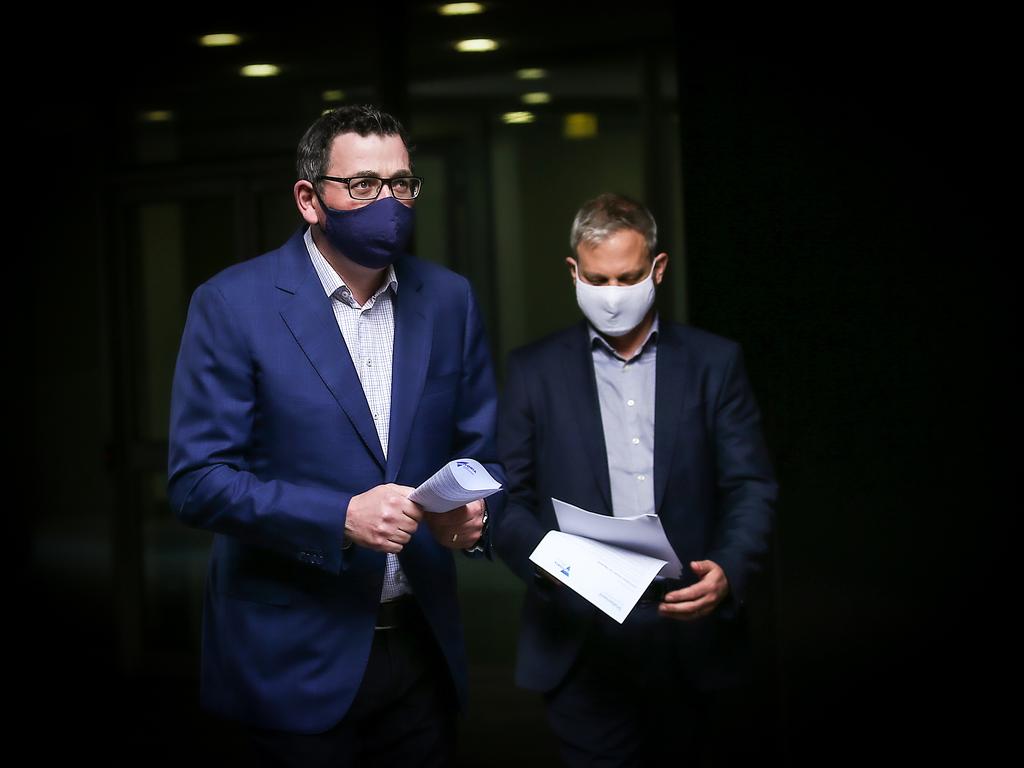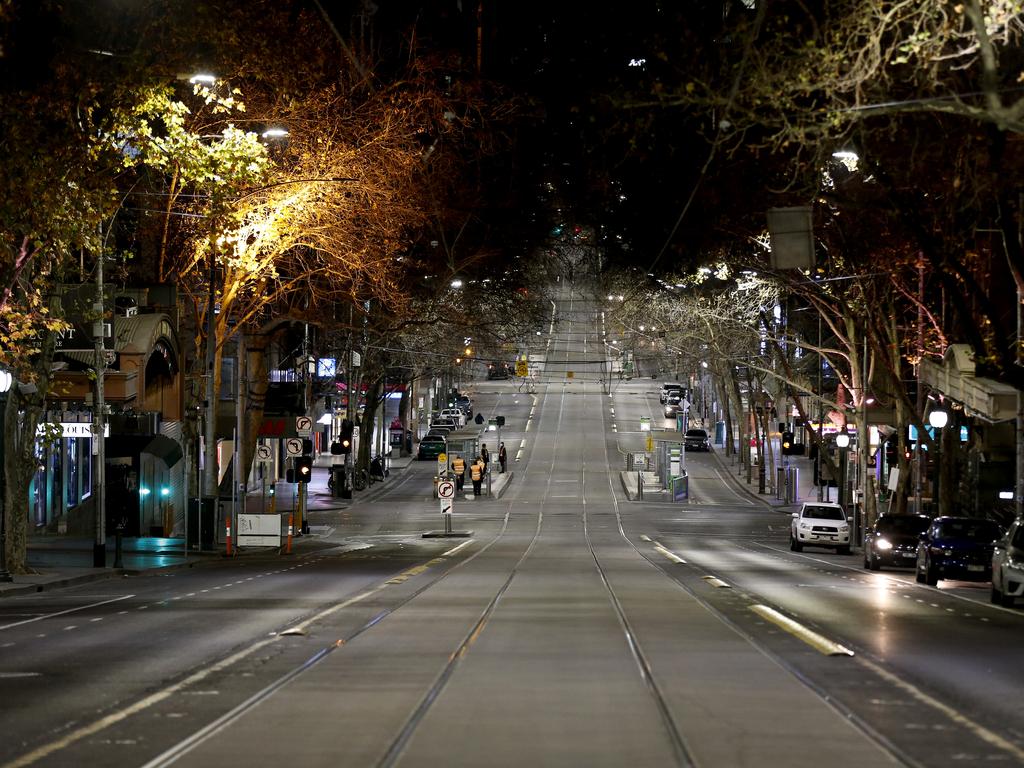Coronavirus Victoria: Who can come to my house? Will schools close?
A raft of business, workplace and home restrictions have been announced for Victoria. Here’s everything you need to know about stage 4.

It’s been a day of unprecedented announcements as Victorian Premier Daniel Andrews revealed almost all retail businesses in the state would close.
Mr Andrews said workers would be divided into three categories as part of “heartbreaking decisions”, after Victoria recorded another 429 cases of coronavirus and 13 deaths, equalling its deadliest day since the pandemic began.
“There will be significant pain,” he said.
“The advice from medical experts is that this is the only way to get these numbers under control, to drive them down low enough so that we can open up again.”
There will be no changes for frontline workers.
Business that are forced to close can apply for $5000 grants.
The changes announced today are expected to see another 250,000 workers stay home for the duration of stage four restrictions, on top of the 500,000 already working from home and the 250,000 stood down.
The three categories Mr Andrews outlined are:
CATEGORY ONE
Supermarkets, grocery stores, bottle shops, pharmacies, petrol stations, banks, newsagencies and post offices can stay open.
CATEGORY TWO
Industries where onsite operations will have to cease for the next six weeks including retail, some manufacturing and some administration.
These businesses will have to close by midnight Wednesday unless they have specific circumstances that mean they need longer to shutdown safely.
Retail stores can continue to offer click and collect and delivery with strict safety protocols in place.
CATEGORY THREE
Industries that are permitted to operate under significantly different conditions.
Mr Andrews said that would include food production, waste collection or supply chain logistics.
All businesses and services will have until midnight Friday to enact a COVIDSafe plan.
READ MORE: PM brings in $1500 disaster payment

CHANGES FOR THE MEAT INDUSTRY
There will be mandated restrictions to the number of workers on site.
In the meat industry - based on the minimum number of people required to operate safely onsite - the workforce will be scaled back to two-thirds.
CHANGES TO CONSTRUCTIONS SITES
For major construction projects, no more than 25 per cent of the normal workforce will be allowed on site.
Small-scale construction will be limited to five people.
WHICH BUSINESSES WILL CLOSE?
Supermarkets, grocery stores, bottle shops, pharmacies, petrol stations, banks, news agencies and post offices will remain open.
Clothing, furniture, electronics and other shops will be shut for six weeks, as will larger department stores like Kmart, Big W, Target, Myer and David Jones.
Victorians who are not tradespeople will not be allowed to enter a Bunnings Warehouse store but they will be able to shop without making contact.
“You will no longer be able to go into a Bunnings store but you will be able to collect goods without making contact,” Mr Andrews said.
Horse and greyhound racing is allowed to continue because it is a “very low risk activity”.
For businesses able to stay open, there will be extra PPE requirements, staggering of shifts and breaks, health declarations and more support for sick workers so they stay home.
For example, an abattoir worker will be fitted out in full PPE - gowns, masks and shields like a nurse would wear. They will also be subject to routine testing
WHO CAN COME TO YOUR HOUSE?
People cannot have cleaners or lawnmowers over. Babysitting should be avoided.
Basically no-one providing anything other than emergency support and ideally, no-one over at your house.
“If you need a plumber because a pipe has burst, then yes, you can have a plumber come and do that work,” Mr Andrews said.
“But it’s not the time to be painting your house or having unnecessary work happen.”
CAN YOU MOVE HOUSE?
Mr Andrews said the government was still doing work on this topic because it was a question that had been raised.
But he said things already planned to happen could continue.
“I don’t want to see people not able to settle on their home,” he said.
“I don’t want to see people who are supposed to move from one place to another because cause the lease has run out unable to do so.
“I think the answer will be yes - if you’ve got a contract, an arrangement in place, then we will allow you to fulfil that.
“But, again, this gets back to the personal choices that each of us make - there will be instances where we’ll make a ruling.”
He said in other instances people should use a bit of discretion and make their own judgments.
“I’d ask people to make the judgement that best supports not spreading this virus, not the judgement that might be convenient but, deep down, you know is actually running a risk,” he said.
“If we all want to be past this, we’ve all got to make - sadly - a very significant contribution to this effort.”
WHO WILL GET GRANTS?
Mr Andrews outlined a series of grants available to businesses forced to close.
“I can announce today that all those businesses that are forced to close, restaurants, cafes, beauty, gyms, all of those in regional Victoria as part of stage three will be eligible for a $5000 grant from our government and we will do our best, our very best to get those paid as quickly as we can,” he said.
“I can announce today we will add a further $5000 to those grant (recipients), acknowledging that they will have been under these restrictions now for a period significantly longer than the first six weeks as foreshadowed.
“So that will mean $10,000, and indeed for those metropolitan businesses, it will finish up being in aggregate terms first and second wave payments in the order of $20,000 together with a number of other waivers of taxes and charges.”
He said the package would be in the order of about $600 million.
The same eligibility criteria applies as it had applied under the state’s first $10,000 grants.
WILL PUBLIC TRANSPORT CONTINUE?
Services will be dramatically reduced. Some need to remain for the people still working.
A number of services will be cancelled.
“That is a reflection as well of having less people moving around the community, less demand for those services, but it is also about being able to redeploy staff, particularly protective service officers to the enforcement of the curfew and the enforcement of all the other rules,” Mr Andrews said.
WILL SCHOOLS CLOSE?
In metropolitan Melbourne only those who are still working will be able to send their kids to school.
Mr Andrews said he would provide more detail on this.
“What I can’t have is to have more teachers, more staff, more students and parents moving around the community than is absolutely necessary,” he said.
“I know that will be incredibly challenging for a number of people who perhaps are working from home. But there’s simply no choice. We’ve all got to make a contribution to less movement rather than more. Less spread of this virus rather than more.”
READ MORE: Where Victoria’s 429 cases are from

PERMIT SYSTEM COMING
More will be announced on this during the week.
“People will have a piece of paper that says, ‘This is where I work, this is what I do’ so that, for the purposes of enforcement, curfew, all of those things, we don’t want to be putting people into that really challenging situation where they have to explain themselves when they don’t really need to,” Mr Andrews said.
“In giving care, getting care or going to and from work, or being at work – they’re the only reasons to be out. Police will be stopping you.
“They will be asking those questions. They’ll do it respectfully. And they’ll be very fair in these early days in that they’ll probably err on the side of – you know, it is early. But the time will come when that gets turned off. And anyone who stops and doesn’t have a lawful reason will get fined. In terms of permits and that broader issue, I’ll have more to say about that soon.”
CAN YOU TRAVEL TO REGIONAL VICTORIA FOR WORK?
If you are in one of the permitted industries you can.
That’s basically so those in healthcare can keep going to work.
But regardless of the setting, regardless of the job you do, no one can go to work if you’ve got even the mildest of symptoms. And as always, you should get tested immediately.




